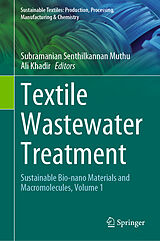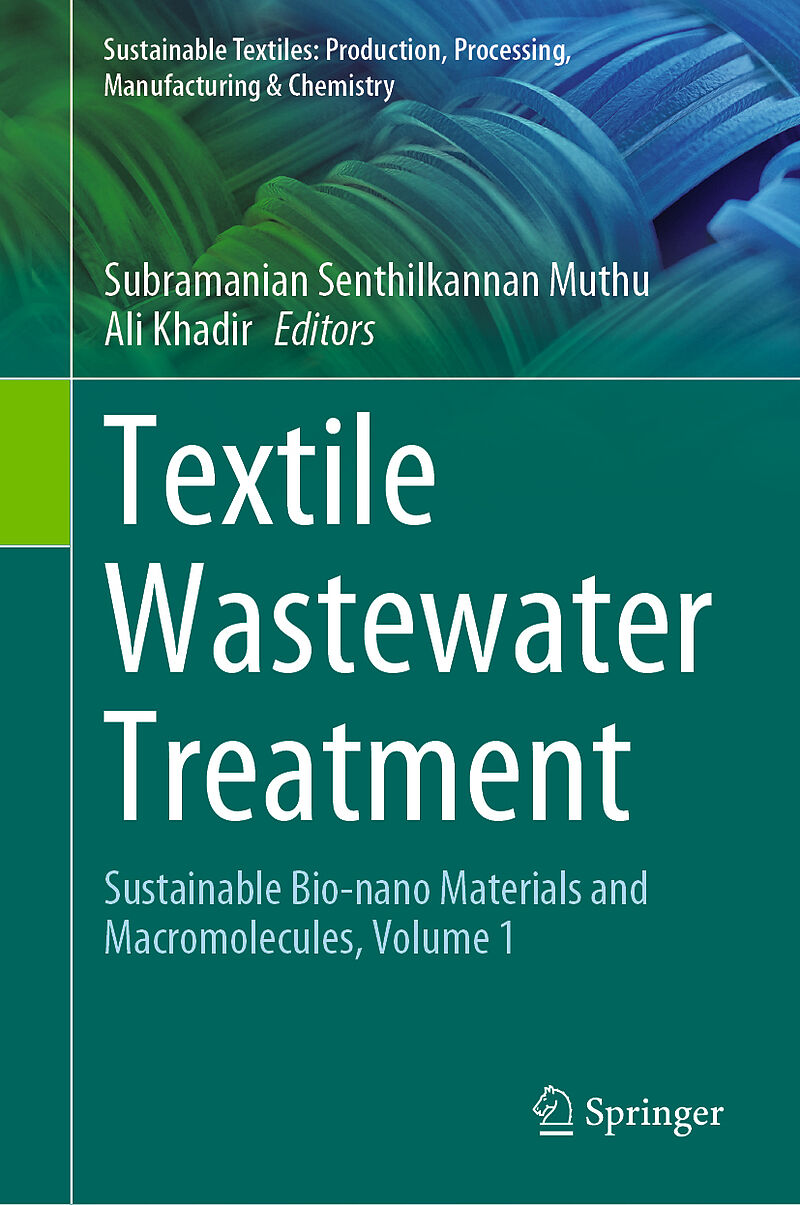Textile Wastewater Treatment
Einband:
Fester Einband
EAN:
9789811928314
Untertitel:
Sustainable Bio-nano Materials and Macromolecules, Volume 1
Genre:
Maschinenbau
Herausgeber:
Springer Nature Singapore
Auflage:
1st ed. 2022
Anzahl Seiten:
416
Erscheinungsdatum:
15.08.2022
ISBN:
9811928312
In this first volume, various materials such as chitosan, lignin-based biomaterials, cellulosic based bio materials, carbon materials, Polysaccharide-composites materials, Aromatic-Based Synthetic Macromolecules, Agricultural wastes, etc for treating textile waste water are highlighted. One of the major pollutants in the textile and fashion industry is (textile) waste water. Textile wastewater can lead to serious environmental issues if discharged without proper and sufficient treatment. The materials employed along with the technologies available to trate waste water are the key. There are a lot of advancements in terms materials, technologies employed for textile waste water treatment. Sustainable bio-nano materials and macro molecules play a major role in the efficient treatment of textile waster.
Highlights advances in textile waste water treatment using sustainable bio-nano materials and macro molecules Presents bio-nano materials and macro molecules such as chitosan, lignin-based biomaterials, etc. Includes various case studies to emphasize the technologies in waste water treatment
Autorentext
Dr. Subramanian Senthilkannan Muthu currently works for SgT Group as Head of Sustainability, and is based out of Hong Kong. He earned his PhD from The Hong Kong Polytechnic University, and is a renowned expert in the areas of Environmental Sustainability in Textiles & Clothing Supply Chain, Product Life Cycle Assessment (LCA) and Product Carbon Footprint Assessment (PCF) in various industrial sectors. He has five years of industrial experience in textile manufacturing, research and development and textile testing and over a decade's of experience in life cycle assessment (LCA), carbon and ecological footprints assessment of various consumer products. He has published more than 100 research publications, written numerous book chapters and authored/edited over 100 books in the areas of Carbon Footprint, Recycling, Environmental Assessment and Environmental Sustainability. Ali Khadir is an environmental engineer and a member of the Young Researcher and Elite Club, Islamic Azad University of Shahre Rey Branch, Tehran, Iran. He has published several articles and book chapters in reputed international publishers. He also has been the reviewer of journals and international conferences. His research interests center on emerging pollutants, dyes, and pharmaceuticals in aquatic media, advanced water and wastewater remediation techniques and technology.
Inhalt
Textile Industry: Pollution Health Risks and Toxicity.- Applications of chitosan and chitin-based biomaterials in cationic dye removal.- Chitosan-based composite beads for removal of anionic dyes.- Application of lignin-based biomaterials in textile wastewater.- Application of cellulose-based biomaterials in textile wastewater.- Cellulose Nanocrystal as a New Promising Candidate in Textile Wastewater Treatment.- Carbon Materials for Dye Removal from Wastewater.- Polysaccharide-composites materials as adsorbents for organic dyes.- Application of Agricultural Wastes for Cationic Dyes Removal from Wastewater.- Application of Aromatic-Based Synthetic Macromolecules in Textile Wastewater.- Synthesis of Hydroxyapatite Nanoparticle from Papermill Sludge.- Adsorptive Removal of Reactive Blue Dye by Cucumber Peel Adsorbent: Isotherm, Kinetics and Mass Transfer Studies.- Application of Dried Fungus in Textile Wastewater.- Application of Waste Utilization in Textile Dye Removal.

Leider konnten wir für diesen Artikel keine Preise ermitteln ...
billigbuch.ch sucht jetzt für Sie die besten Angebote ...
Die aktuellen Verkaufspreise von 5 Onlineshops werden in Realtime abgefragt.
Sie können das gewünschte Produkt anschliessend direkt beim Anbieter Ihrer Wahl bestellen.
Loading...
Die aktuellen Verkaufspreise von 5 Onlineshops werden in Realtime abgefragt.
Sie können das gewünschte Produkt anschliessend direkt beim Anbieter Ihrer Wahl bestellen.
| # | Onlineshop | Preis CHF | Versand CHF | Total CHF | ||
|---|---|---|---|---|---|---|
| 1 | Seller | 0.00 | 0.00 | 0.00 |
